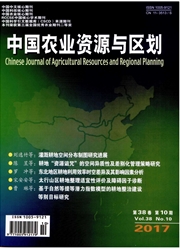

 中文摘要:
中文摘要:
目前中国的农地整理项目的运作模式是一种"自上而下"的模式,主要由政府出资和指导,农民作为主要的受益主体参与较少,被定位为项目决策的接受者,导致农民群体的真实利益诉求不能很好地显现出来,极大地影响了农地整理项目的实施效果。因此,该文试图通过对湖北省部分县市农地整理项目区域农民的随机调查,分析目前农地整理过程中农民的利益诉求,并采用模糊综合评判法对农民的利益诉求进行综合评价。结果表明:利益诉求"较强烈"的农民占的比例最大,达到36.60%;利益诉求"很强烈"和迫切的农民占到14.00%;诉求态度"一般"的农民比例为28.20%;利益诉求"较弱"的农民比例为18.70%;利益诉求"很弱"的农民比例为2.50%。依据模糊综合评判的最大隶属度原则,得出目前农民对农地整理意见较大,拥有"较强烈"的公共利益诉求。
 英文摘要:
英文摘要:
Farmers are the ultimate beneficiaries of land consolidation projects having local knowledge that local government and relevant technical personnel do not have. Meanwhile,they are mostly familiar with local agricultural production conditions and the improvement space. Their interest demands deserve the recognition and attention.But at present in China,the operation mode of land consolidation project is " top- down",mainly supported by government investment and guidance. Farmers as the main benefit body participate less and are positioned as the project decision- making recipients that finally leads to the ignorance of farmers real interests demand,and greatly influences the effect of land consolidation projects. Through random investigation into farmers in rural land consolidation projects of some counties in Hubei province,this article analyzed the current interest demands in rural land consolidation,and used the fuzzy comprehensive evaluation method to analyze comprehensive evaluation of farmers' interest demands. The results showed that farmers whose interest demands appealed " relatively strong" accounted for the largest share of 36. 60%; farmers whose interest demands appealed " very strong" accounted for 14. 00%;farmers whose interest demands appealed " general" accounted for 28. 20%; farmers whose interest demands appealed " weaker" accounted for18. 70%; farmers whose interest demands appealed " very weak" accounted for2. 50%. Based on the maximum membership degree principle of fuzzy comprehensive evaluation method,it concluded that farmers had great complaints on rural land consolidation projects in some counties in Hubei province,and most farmers in this investigation had " relatively strong" public interest demands in rural land consolidation.
 同期刊论文项目
同期刊论文项目
 同项目期刊论文
同项目期刊论文
 期刊信息
期刊信息
